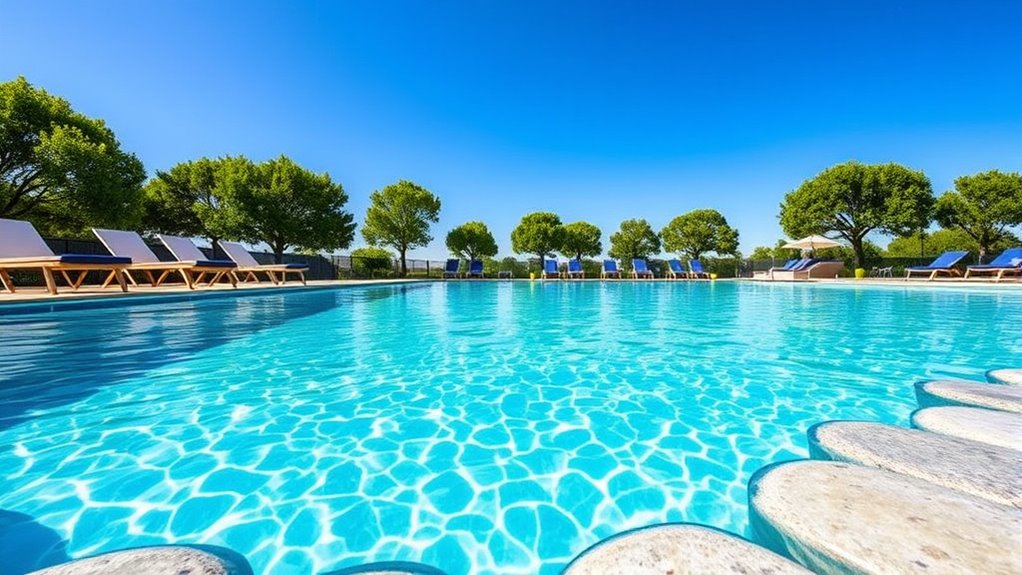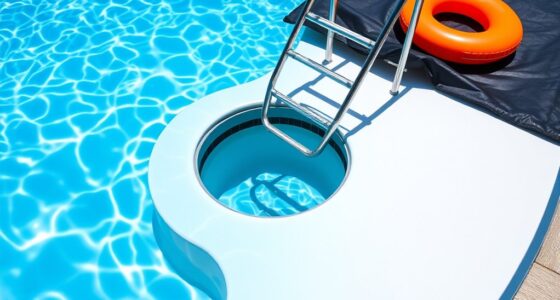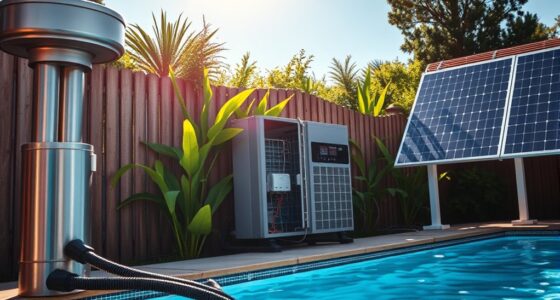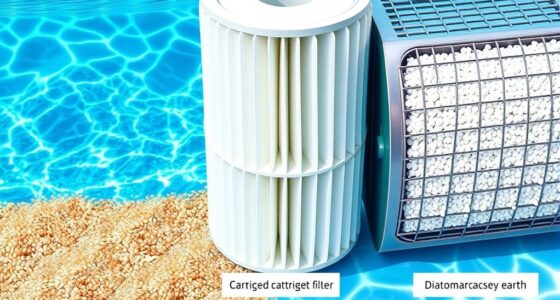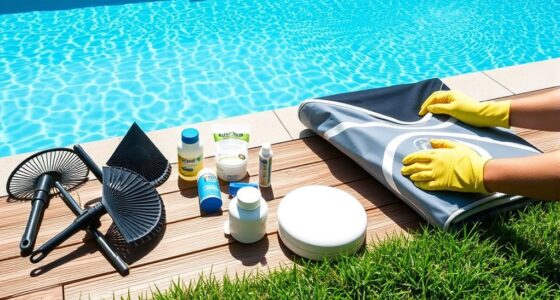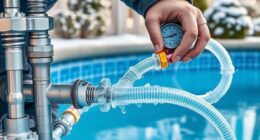Saltwater pools are a popular choice because they offer a gentler swimming experience and require less chemical balancing than traditional pools. They use salt to generate chlorine, which keeps the water safe but still demands regular testing of pH, alkalinity, and salt levels. While they usually have softer water and lower chemical odors, you need to watch for potential corrosion and equipment maintenance. To discover more about how to maintain a balanced, safe saltwater pool, keep exploring what’s involved.
Key Takeaways
- Saltwater pools offer a gentler, more comfortable swimming experience compared to traditional chlorine pools.
- They require less chemical maintenance but need regular monitoring of pH, alkalinity, and salt levels.
- Salt can cause corrosion in certain pool components, necessitating proper materials and maintenance.
- Proper chemical balance is essential for water safety, preventing algae, bacteria, and equipment damage.
- Managing salt levels within recommended ranges ensures efficient chlorination and prolongs equipment lifespan.
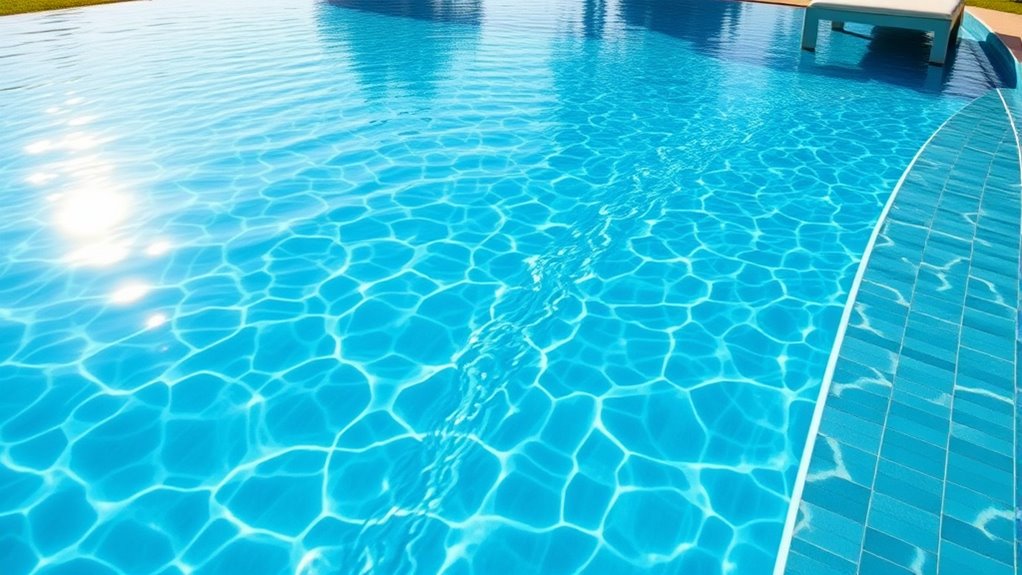
Saltwater pools have become increasingly popular as a more gentle alternative to traditional chlorinated pools, offering a different approach to maintaining clean and safe swimming environments. If you’re considering installing one, you’ll want to understand how saltwater systems impact pool maintenance, especially when it comes to chemical balance. Unlike traditional pools that rely heavily on liquid chlorine or chlorine tablets, saltwater pools generate their disinfectant through a salt chlorination process. This means you’ll need to monitor and adjust the chemical balance less frequently, but it’s still vital to keep an eye on key parameters to make certain your pool remains safe and inviting.
Maintaining proper chemical balance in a saltwater pool involves more than just checking salt levels. You need to keep an eye on pH, alkalinity, and calcium hardness. Saltwater pools tend to have a steadier pH level, but they can still drift out of balance over time, especially if you use the pool heavily or experience weather changes. When the pH gets too high or low, it can cause skin and eye irritation, scale buildup, or corrosion of pool equipment. Regular testing is essential, and you’ll often find that balancing these chemicals is simpler because saltwater pools tend to have less chlorine demand, resulting in fewer swings in chemical levels.
Maintaining chemical balance in saltwater pools is easier due to lower chlorine demand, but regular testing of pH, alkalinity, and calcium hardness remains essential.
However, you should be aware that salt can cause corrosion in certain pool components if not properly maintained. For example, metal fixtures or heaters may need special coatings or materials resistant to salt corrosion. This means your overall pool maintenance routine should include inspecting equipment regularly and possibly using corrosion inhibitors. Additionally, while saltwater pools produce less chlorine, they still require the right amount of disinfectant to prevent algae growth and bacteria accumulation. Balancing the chemical levels guarantees you don’t over-chlorinate, which can lead to a harsh swimming experience, or under-chlorinate, which risks water safety.
Another aspect of pool maintenance involves managing salt levels. You’ll need to test the salt concentration periodically, typically with a specialized salt test kit, to make certain it stays within the recommended range, usually between 2,000 and 4,000 parts per million (ppm). Too much salt can damage equipment, while too little may reduce the effectiveness of the chlorinator. Adjusting salt levels is straightforward but requires diligence.
Frequently Asked Questions
How Much Do Saltwater Pools Typically Cost to Install?
Saltwater pools typically cost between $20,000 and $30,000 to install. Your installation costs depend on factors like pool size, location, and the type of saltwater system you choose. Price factors include the pool’s size, any additional features, and existing infrastructure. To get an accurate estimate, consider consulting a professional who can evaluate your space and provide tailored pricing based on your specific needs.
Are Saltwater Pools Suitable for All Types of Skin?
Saltwater pools are like a gentle breeze for most skin types, but they may not suit everyone. If you have sensitive skin, you might experience irritation, especially if you use certain pool accessories that trap chemicals or debris. It’s wise to test your skin’s reaction and consult a dermatologist if needed. Overall, saltwater pools tend to be milder, but individual sensitivities vary—pay attention to your own comfort.
What Maintenance Is Required for Saltwater Pools?
You need to regularly check your saltwater pool’s salt level and keep it balanced for proper sanitization. Test the water weekly and add salt as needed, especially after heavy use or rainfall. Also, clean the cell and filter system to prevent buildup and make certain of efficient sanitization. Routine maintenance includes monitoring pH levels and chlorine output, which helps keep your pool safe, clean, and inviting for every swim.
Can I Convert My Existing Chlorine Pool to Saltwater?
Yes, you can convert your existing chlorine pool to saltwater. To do a pool conversion, you’ll need to install a saltwater chlorinator and add the right amount of salt, ensuring your pool is saltwater compatible. Make sure your pool’s materials are compatible with saltwater, and follow the chlorinator’s instructions for a smooth shift. Regular maintenance will help keep your new saltwater system running efficiently.
Are There Environmental Impacts Associated With Saltwater Pools?
Yes, saltwater pools can have environmental impacts. You might worry about chemical runoff, as excess salt or chlorine could seep into nearby soil or water sources. This runoff can harm local ecosystems and aquatic life. Additionally, the production and disposal of salt and other chemicals contribute to environmental concerns. To minimize these impacts, maintain proper chemical levels and avoid overuse, helping protect your surroundings while enjoying your pool.
Conclusion
Now that you’ve weighed the pros and cons, it’s clear saltwater pools can transform your backyard into an oasis—like having a personal paradise right at your doorstep. While they’re easier on your skin and require less chemical fuss, they do come with higher upfront costs and maintenance quirks. Ultimately, whether you choose saltwater or traditional, your decision shapes your ultimate relaxation haven. So plunge in confidently—your perfect backyard retreat awaits, just like a vacation in your own personal paradise!
